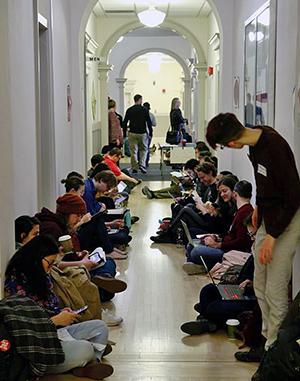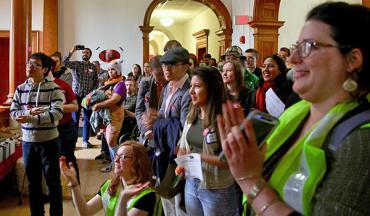Given their notoriously low pay, graduate employees at universities across the United States frequently struggle to make ends meet, but at the University of Wisconsin-Madison that struggle is compounded by mandatory fees. Not only are many of the graduate workers there paid less than a living wage, they also are expected to pay 10 to 18 percent of those salaries back to the university in student fees.
The Teaching Assistants’ Association is fighting back. Earlier this month it staged a sit-in to protest; some 400 teaching assistants, research assistants and project assistants representing 100 different departments packed Bascom Hall April 5 in the largest TAA action since 2009. “The university definitely has the power to cover these fees for graduate workers, it’s just a matter of whether they have the will,” says Megan Kennedy, a graduate worker in Slavic languages and literature. The fees make up just 0.2 percent of the university budget, which is expected to increase this year. In fact, the board of regents recently approved a 23 percent increase in the salary range for the UW system president.
Meanwhile, graduate employees are stuck paying fees for things like bus passes and university healthcare. “While these fees go to important services, they’re an incredible burden on students,” says TAA Co-president Chance McMahon. “The outcome is that students of color, first-generation college students like me, or other students who are in economically precarious situations, aren’t able to continue being graduate students.”
“It’s a major financial burden to pay back 10 percent of our salary to the university for the right to work there,” says Ellen LeClere, a grad worker in archival education and theory. At least half of the other universities in the Big Ten cover some part, and sometimes all, of the fees for their graduate workers.
The TAA anti-fee campaign is pressing the University of Wisconsin to follow suit. The campaign also includes measures to increase graduate workers’ pay, decrease fees for international grad workers—which are $200 more than those for United States-citizen workers—and clarify grad worker policies generally. The grads have been working under an unclear contract since 2011, when Wisconsin Act 10 abolished collective bargaining in the state.
The Teaching Assistants’ Association at UW-Madison is the oldest graduate employee union in the country, established in 1966, and it was, for a long time, one of the strongest. Its influence echoed loudly throughout the Wisconsin Statehouse during the fight for collective bargaining, when hundreds of members camped out for days, filling the halls and spilling onto the grounds to protest then-Gov. Scott Walker’s attack on labor unions.
The union has persisted despite Act 10, and although there are no formal negotiations, members have been meeting with the employer for the last two years, hammering out a new set of employment policies. They’ve also flexed their muscle through protests and sit-ins, and through collaboration with community allies.
TAA has gathered more than 1,000 signatures for a better mandatory fee policy; presented personal stories of financial hardship to administrators; held the April 5 “work-in”; secured a policy that delays mandatory fee payment until after graduate workers have accumulated three paychecks; and won a 13.3 percent raise for the lowest-paid graduate assistants in the system. They’ve also gained support from the community: The faculty senate passed a resolution urging the university to cover graduate worker fees, and the city of Madison passed a resolution declaring the international graduate employee fees discriminatory.
“We’re eager to provide undergraduates critical-thinking skills to help make Wisconsin, and the world, a better place,” says McMahon, referring to the lofty Wisconsin Idea, which pledges university support to improve the quality of life for everyone in the state. “But our economic conditions often make it really difficult to provide this great education to undergraduates.”
[Virginia Myers]


